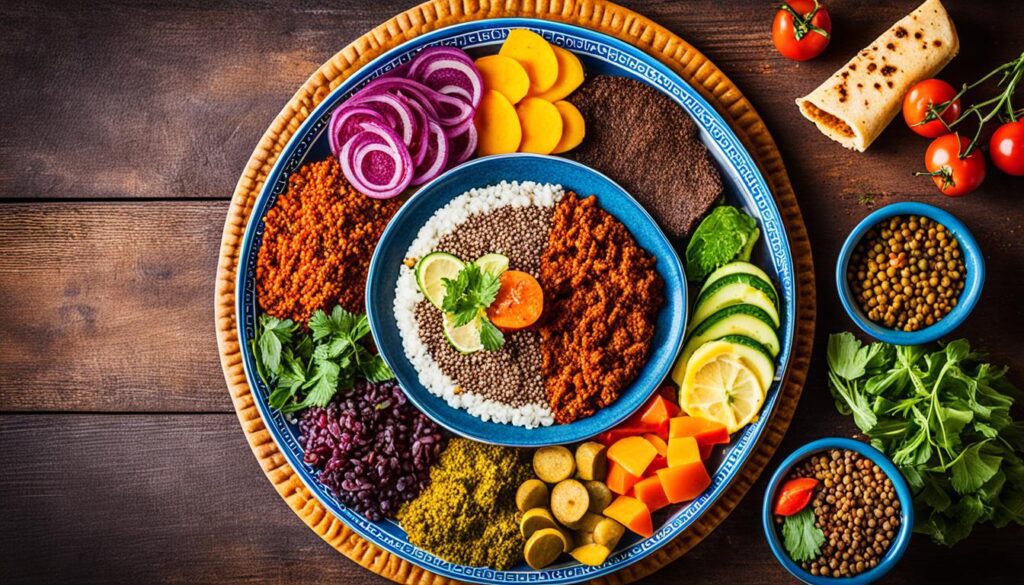Is Ethiopian Food Fattening?
When it comes to exploring different cuisines, Ethiopian food often piques our curiosity with its vibrant flavors and unique dishes. However, if you are health-conscious and watching your weight, you might have wondered whether Ethiopian food can contribute to weight gain. Does indulging in injera and doro wat mean sacrificing your health goals?
In this article, we will delve into the question: Is Ethiopian food fattening? We will examine the nutritional profile of Ethiopian cuisine and discuss how it can be balanced within a healthy diet. Whether you’re a fan of Ethiopian food or simply curious about its impact on your weight, we’ve got you covered.
Key Takeaways:
- Exploring the potential impact of Ethiopian food on weight gain
- Understanding the nutritional value of Ethiopian cuisine
- Tips for incorporating Ethiopian food into a balanced and healthy diet
- Debunking common misconceptions about the fattening nature of Ethiopian food
- Savoring the delicious flavors of Ethiopian cuisine without compromising your health goals
Understanding Ethiopian Cuisine
Before we delve into the potential impact of Ethiopian food on weight, let’s first gain an understanding of what Ethiopian cuisine entails. Ethiopian cuisine is a rich combination of flavors, spices, and cooking techniques that have evolved over centuries. It is known for its unique blend of aromatic herbs, vibrant spices, and diverse ingredients.
At the heart of Ethiopian cuisine are staple ingredients such as teff, a gluten-free grain, injera, a sourdough flatbread, and a variety of lentils, vegetables, and meats. These ingredients form the foundation of many traditional Ethiopian dishes.
In terms of cooking methods, Ethiopian cuisine incorporates both simple and complex techniques. Some dishes are slow-cooked to develop deep flavors and tenderize the ingredients, while others involve quick stir-frying or grilling. Many Ethiopian dishes also feature a unique spice blend called berbere, which adds a distinctive flavor profile to the cuisine.
To give you a visual representation of Ethiopian cuisine, here’s an image showcasing a platter of injera, a staple bread traditionally served with various stews and curries:
Nutritional Profile of Ethiopian Food
In this section, let’s delve into the nutritional aspects of Ethiopian food and explore the components that contribute to its calorie content. Ethiopian cuisine is renowned for its diverse flavors and unique combination of ingredients, making it a fascinating culinary experience.

Grains, such as teff, barley, and millet, form the foundation of many Ethiopian dishes. These grains provide a rich source of complex carbohydrates, which are essential for energy production and maintaining a balanced diet.
The use of legumes, such as lentils and chickpeas, adds a significant nutritional boost to Ethiopian cuisine. Legumes are excellent sources of plant-based protein, dietary fiber, and essential minerals like iron and potassium.
Vegetables are also prominent in Ethiopian food, contributing to its nutritional diversity. From collard greens to carrots and cabbage, these vegetables provide a wide range of vitamins, antioxidants, and dietary fiber necessary for overall health and well-being.
When it comes to fats, Ethiopian cuisine incorporates healthy sources such as olive oil or sunflower oil in moderate amounts. These oils provide essential fatty acids that support brain function and promote the absorption of fat-soluble vitamins.
Ethiopian dishes often incorporate a variety of spices and herbs, not only for flavor but also for their potential health benefits. Common spices like turmeric, ginger, and cumin may possess anti-inflammatory and antioxidant properties.
In summary, Ethiopian food offers a diverse nutritional profile filled with an array of grains, legumes, vegetables, and beneficial spices. By understanding the components that contribute to its calorie content, we can make informed choices and enjoy the rich flavors while maintaining a balanced and healthy diet.
Balancing Ethiopian Food in a Healthy Diet
Now that we have a better understanding of Ethiopian cuisine and its nutritional profile, let’s explore how we can incorporate Ethiopian food into a balanced and healthy diet. By following these simple tips, you can enjoy the unique flavors of Ethiopian cuisine while maintaining a nutritious and well-rounded eating plan.
1. Practice Portion Control
When enjoying Ethiopian dishes, it’s essential to be mindful of portion sizes. Ethiopian meals are often served on a communal platter and traditionally eaten with injera, a sourdough flatbread. Remember to pay attention to your portion sizes and listen to your body’s hunger and fullness cues.

2. Choose Nutritious Dishes
To maintain a healthy diet, opt for Ethiopian dishes that are packed with nutritious ingredients. Look for menu items that feature a variety of vegetables, legumes, and lean proteins. Dishes like lentil stews, vegetable curries, and grilled chicken provide ample nutrients without excessive calories.
3. Pair with Complementary Foods
Enhance the nutritional value of your Ethiopian meal by pairing it with complementary foods. For example, enjoy your injera and lentil stew with a side of leafy greens or a fresh salad. Complementing your meal with nutrient-dense options helps create a more balanced eating experience.
4. Consider Substitutions
If you’re looking to reduce calorie intake or prioritize specific dietary needs, consider making substitutions in your Ethiopian dishes. For instance, you can opt for whole grain injera instead of the traditional version made with white flour. Additionally, explore plant-based options to replace meat dishes without sacrificing flavor.
By incorporating these tips into your eating habits, you can enjoy the vibrant flavors of Ethiopian cuisine while maintaining a healthy diet. Remember, the key is moderation and making mindful choices that support your overall well-being.
Conclusion
In conclusion, understanding the composition of Ethiopian food and its place in a healthy diet is important when considering its potential impact on weight. Ethiopian cuisine offers a variety of nutrient-rich ingredients and flavors that can be enjoyed as part of a well-rounded eating plan. By making informed choices and practicing moderation, you can savor the delicious flavors of Ethiopian cuisine without compromising your health goals.







